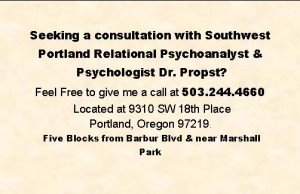LOW SELF-ESTEEM and INSECURITY
“Even though I have worked hard and accomplished much, I have never been able to shake a feeling of inadequacy. It does not matter how much people praise me–I feel useless.”
“When I get right down to it, I really don’t think anyone really wants to be my friend.”
“I am invisible to others. I hate that, but I am afraid to be otherwise.”
Self-esteem refers to how we feel about different dimensions of ourselves–our emotional, intellectual, physical, social, or work self. Essentially, there are three options: We can feel appropriately confident of ourself in the above areas; we can have a view of ourselves that is not realistic and overly-idealized; or we can feel inferior and assume we are deficient in one or more of these areas. Interestingly, individuals who feel inferior in one area of life, usually feel inferior in most areas of their life. Additionally, you could be unaware of your own experiences of yourself, and perhaps not fully realize just how inferior you might feel about yourself.
Your view of yourself comes from how others in our early life treated you, including parents & significant others. To feel realistically good about yourself, you needed to have had these significant others who paid attention to you and affirmed you and gave you age-appropriate positive and realistic feedback.
In all of this, you needed a feeling of specialness from your parents. Being special meant that a parent or caregiver must appreciated you because you were just you, not just because of what you accomplished. Good parents had to value all parts of us, but yet not over-indulge us. Either extreme can lead to a damaged sense of oneself, difficulties in inter-personal relationships, and depression. Low self-esteem can also be provoked by bullying or destructive peers.
Cognitive therapy or counseling can provide you with some tools to aid you in learning to cope with some of your negative thoughts about yourself, through the process of mindfullness of negative thoughts and the development of tools for substitution of more affirming or less destructive thoughts. This process can prove helpful for many individuals, and may improve some of the resultant depressive feelings and symptoms. Interpersonal or relational psychoanalysis can carry this process further, if cognitive therapy is not sufficient. It can help you develop a stronger more positive experience of yourself, and also develop more satisfying and fulfilling committed relationships. Often, low self-esteem comes from difficulties in relationships, so the individual’s relational intelligence must be enhanced before he or she feels better about herself.
Low self-esteem and relationship difficulties can aggravate each other in some of the following ways:
1. Individuals who have a low or weak sense of themselves may also provoke the attack of others. If our essential self-image of ourselves is as hateful, bad and worthless, we expect, and indeed may require a reciprocal hateful view of the world. Positive interchanges are likely to lead towards confusion and feelings of inauthenticity. Sometimes, in the face of positive changes, we might become hyper-self-critical, that is, “I don’t deserve that,” or “it does not feel real.”
2. Sometimes if an individual feels inadequate, he or she may react to positive exchanges with negativity. This is because they can’t bear that someone will reject them again. We become rejecting or even subtly rejecting of others, or dismissive, or unlistening, often as a protection. Of course, such dismissiveness leads to an equal reciprocity of dismissiveness.
3. Finally, sometimes individuals who feel inadequate may avoid close emotional relationships either because they fear the other will not want them or they fear really being known by the other because of their perceived flaws. Such emotional distance can lead the other to “give up and go away.”


